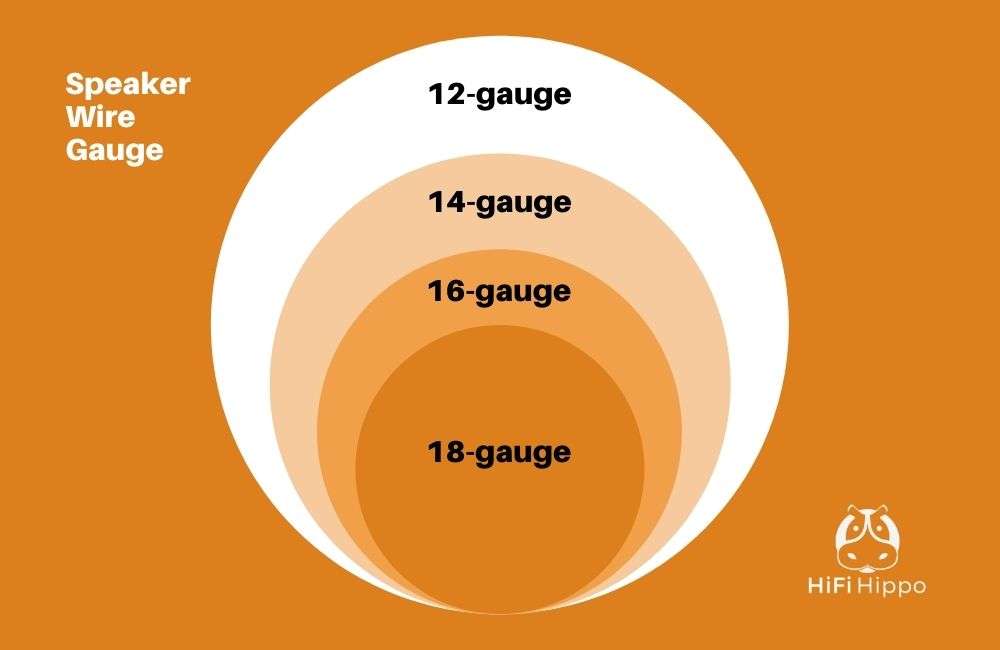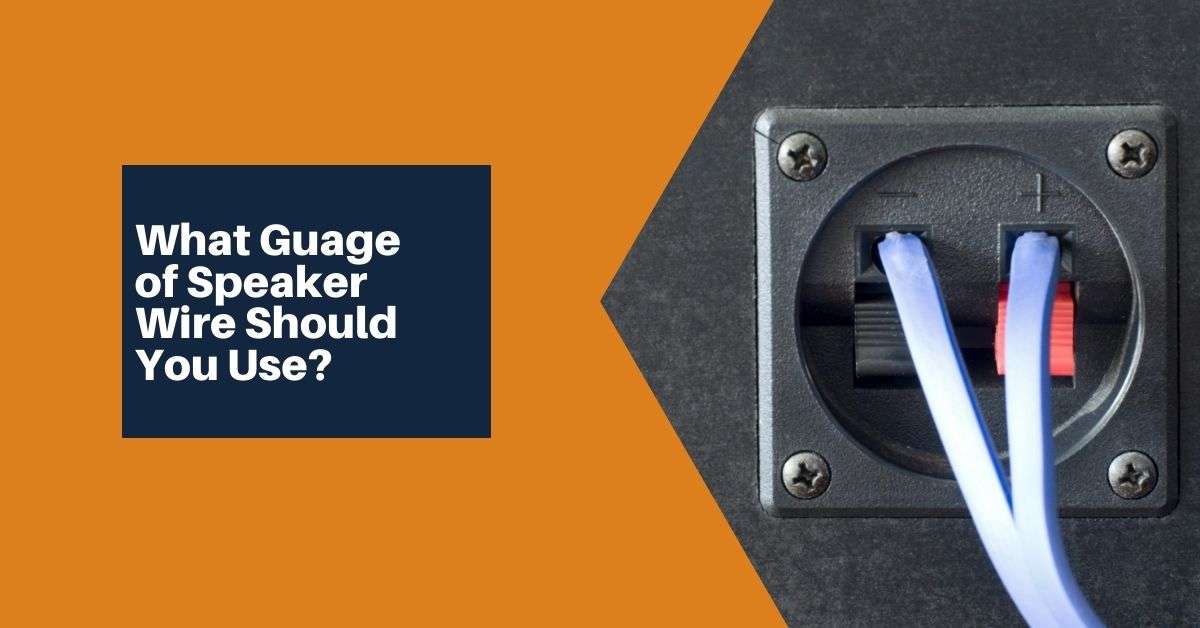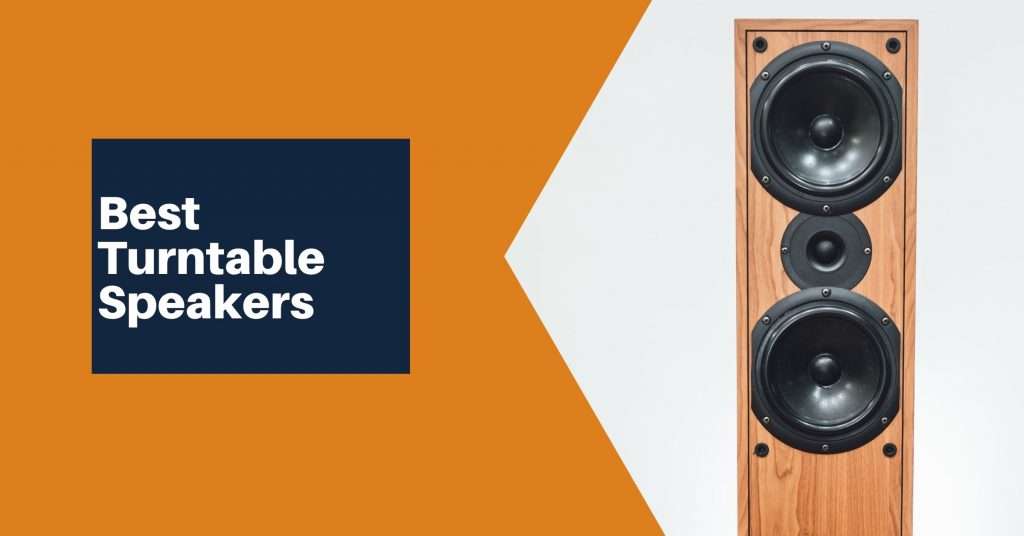After buying your dream speakers and sound system, the last thing you want to do is think about a speaker cable and focus on the “boring” bits. Chances are, you want to crank up the volume, listen to your favorite music on full blast, and dance the night away.
But having the correct speaker wire is a crucial part of your sound system’s function, and many systems don’t actually come with speaker cables. So, you need the knowledge to buy the correct one yourself.
A critical aspect of finding the right speaker wire is selecting the proper gauge (or thickness). This guide details everything you need to know to help you purchase the right one. You’ll be playing music until the sun comes up in no time!
What Speaker Wire Gauge Do You Need?
A speaker wire’s AWG number (American Wire Gauge) indicates its thickness. The thicker a wire is, the lower the gauge number, and vice versa. The thinner a wire is, the greater resistance it provides to current flow.
Essentially, to achieve the best audio performance, the resistance needs to be below a certain level. This is why a thicker wire gauge is ideal.
If you are ever unsure of the right gauge size for your new speakers, consult the manufacturer you bought the system from to give you advice and help you with the installation process.
What Elements Make a Good Quality Speaker Wire?
There are a variety of elements and components that give a speaker wire gauge great quality. One of the most important aspects is a core that has a low resistance. This means the less resistance a core has, the more signal that will be able to reach the speaker from the amplifier.
Copper is a material that’s commonly present in speaker wires. This is because it is used as the core conductor for both a speaker cable and an electrical cable. Copper is also a great material for conducting electricity due to its conductor having low resistance.
If you’d like a speaker wire gauge to be high in quality, you should also consider low inductance and low capacitance. However, these elements are not as important as resistance. Speaker wires should also have long-lasting and flexible insulation on the outside of their core. Flexibility is important, as this quality will let you install speaker wires in unconventional ways. The insulation needs to be high-quality because it needs to protect the core from electrical oxidization. Otherwise, it could degrade over time.
Different Types of Speaker Wire Gauge & The Best Ones For You

The most common sizes for a speaker cable are 12, 14, and 16-gauge. These are the ideal sizes for wiring in stereo music systems, home theaters, and other non-industrial/commercial products. When it comes to finding the best speaker wire gauge, it all depends on how far you want to run the cable, the impedance of the speakers, and the type of material the conductor is made from.
How Far Do You Want To Run Your Cable?
If you are looking for a wire to perform relatively short runs, a 16-gauge wire is your best option. Not only are they efficient and easy to work with, but they also save you money in the long run.
Wires that are 12 or 14 wire gauges are classed as thicker. They are best for running high power units, long wire runs, and speakers that have a low impedance, which means 4 or 6 ohms.
What Is the Impedance?
The impedance of a speaker is the load it places on an amplifier. It’s the resistance a speaker provides to the current that is supplied by the amplifier. The reason it is called impedance is that the output current of an amp is AC (not DC like a battery). In every speaker, the impedance reading is in ohms, which shows how much power the speaker needs. Essentially, the lower the impedance, the more efficient the electric signal is.
The impedance needs to be lower to allow your sound equipment to be as loud as possible and to let the signal pass through.
What Materials Are Best?
When it comes to the materials featured in a high-quality wire, there are three main conducting ones available:
Copper
As previously stated, copper is one of the primary materials used to make a speaker wire gauge. It has been used for decades in many industries to generate electricity. The wire is usually made from stranded copper. This copper type is made from lots of thin lengths of copper that are all packed tightly together.
Silver
Silver is a material that is more common among audiophile speakers. These are products with the most exceptional sound quality, which is why silver is often the preferred material to use. Silver can get the best quality out of the speaker wire. It’s better at conducting electricity than other materials, including copper, which is why manufacturers often choose it for higher-quality products. With a silver speaker wire, however, the cable will most likely be silver-plated copper as opposed to pure solid silver. While you can purchase a solid silver cable, be aware that it will be costly.
Copper-Clad Aluminium
Copper-clad aluminum (or CCA) hit the market when copper began to become more expensive. Because it is cheaper to construct, it has become a more popular material to make and buy. It typically takes the shape of many strands, like regular copper. However, each strand possesses an aluminum core that features an outer layer of thin copper. CCA has a different resistance to copper, so you may require a thicker cable than a normal copper wire for the same cable run.
How Much Should You Spend on Your Speaker Wire?
As a general rule of thumb, experts recommend that you spend at least 5% of the overall cost of your sound system or home theater. Some people may opt to pay 10% more. However, it is all up to your personal preference.
You should also factor in the space from the front of your speakers to the AV receiver when considering the cost. For example, if you are not running your cable for a long distance, you could spend more money per ft. and increase the material’s durability and overall cable quality. However, if you are running larger distances and the sound system requires higher quality cables, you will need to make sure you have the correct gauge for the installation. Having a thicker wire will enable you to have a longer run without the high-end frequency suffering.
Choosing the Right Speaker Wire Gauge — Consider Your Preferences
At the end of the day, you want your speaker, sound system, or home theater to have the best quality sound possible. Taking a look at your specific system and catering to the speaker wire gauge size that fits it the most will guarantee you don’t neglect the overall sound.
Whether your goal is to set up your system on a budget or if you want the best sounds you can get, research is everything. This guide should have helped in making your speaker wire gauge decision.
Related Articles

Lead Editor / Owner
After beginning his career in the video and audio recording industry, Andrew started HiFi Hippo to share his knowledge and passion for vinyl and vintage audio with other readers.


